As Benjamin Franklin wrote to Jean-Baptiste Leroy in 1789, “‘In this world nothing can be said to be certain, except death and taxes.” While death is quite often used as a premise ad nauseam in films, be it through the guise of a horror or heavy drama, it’s not often that either of these definitive aspects of life is looked at in film with a sense of authenticity and with an eye towards the totality of the circumstances surrounding each. Writer/director Jacob Kornbluth took care of taxes with the rather comedic, albeit truthful, extremely funny “Love & Taxes”, and now (thankfully), writer/director/actor Larry Clarke makes his directorial debut taking a look at the behind-the-scenes “business” of death with 3 DAYS WITH DAD. And while loss and death are very somber and sobering experiences, somehow humor inherently finds it’s way into the mix, giving all a moment of respite, a moment of perspective, a moment or two of joyous remembrance and laughter, and more than a moment of insanity. In other words, great fuel for dark comedic fodder. And it’s those moments that bubble to the surface in Clarke’s semi-autobiographical charming, funny, yet poignantly endearing story. 3 DAYS WITH DAD touches the heart and tickles the funny bone.
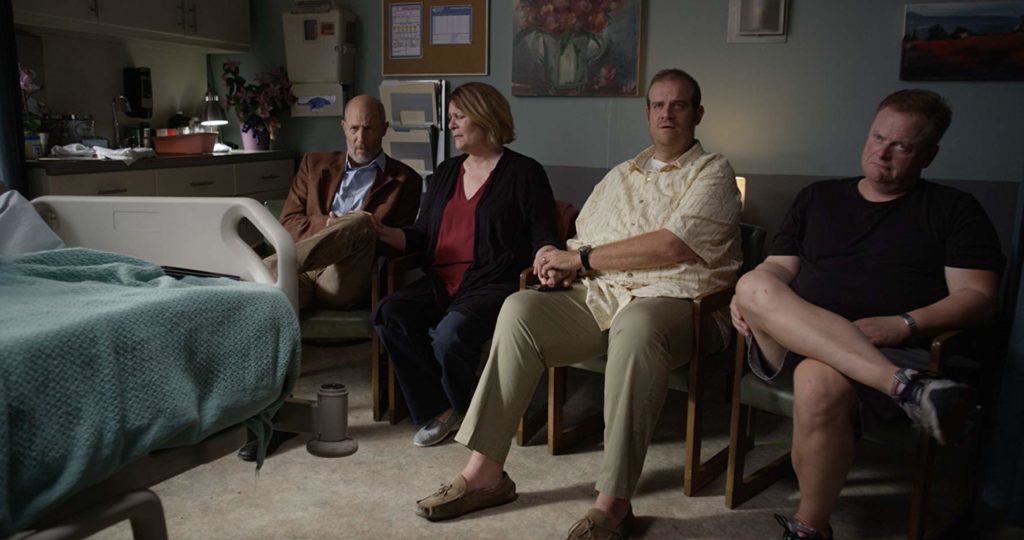
How many of us have been touched by the death of a loved one, a family member? And possibly even more emotional, watch a loved one go from thriving and vital to a mere shell of themselves, unable to function or communicate as the body shuts down and death comes? It’s heartwrenching. And that’s where 3 DAYS WITH DAD begins – at the funeral for family patriarch Bob with four combative adult siblings, each reverting to a childlike state of behavior, and Dawn, widow and stepmom, at obvious odds with her stepchildren. In other words, an average dysfunctional American family complete with the fears, fun, fights, foibles, and flaws that we all know so well.
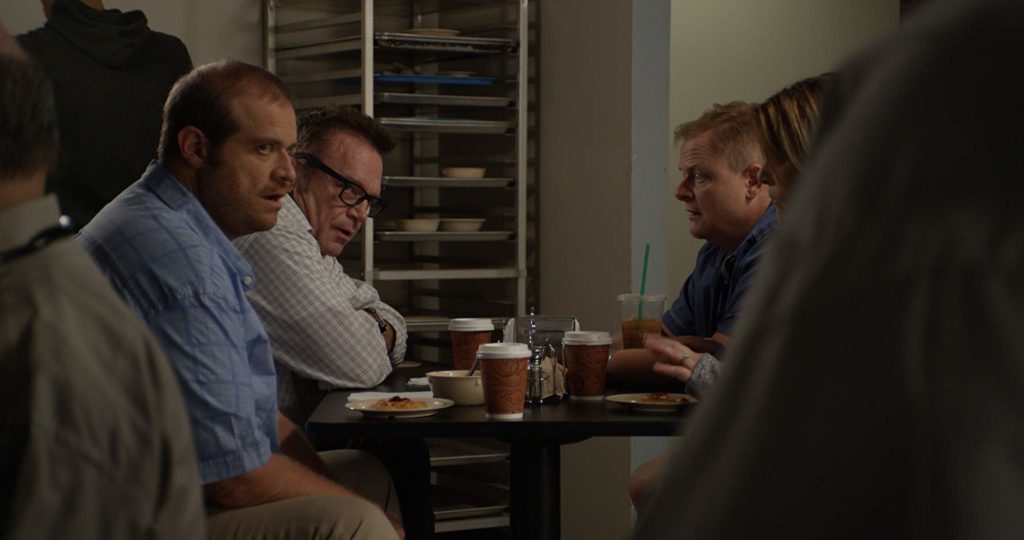
Taking the tact of starting at the end of one’s life and then focusing on the familial events leading up to that final moment, Clarke introduces us to the Mills family; siblings, Eddie who works as a doorman at a hotel in Chicago, Andy, Zac, and Diane who is married to Tim; and step-mom Dawn. The sibling dynamic is apparent from the get-go as rosary-bead clutching Andy, nice guy Zac, somewhat histrionic Diane and her buttinsky husband Tim, all live in the same area in Maryland where they grew up and appear to move like a pack and act in consort while treating Eddie more like an interloper. Dawn is a petite soft-spoken widow who believes herself a fashion plate as evidenced by her Jackie Kennedy-esque funeral attire.
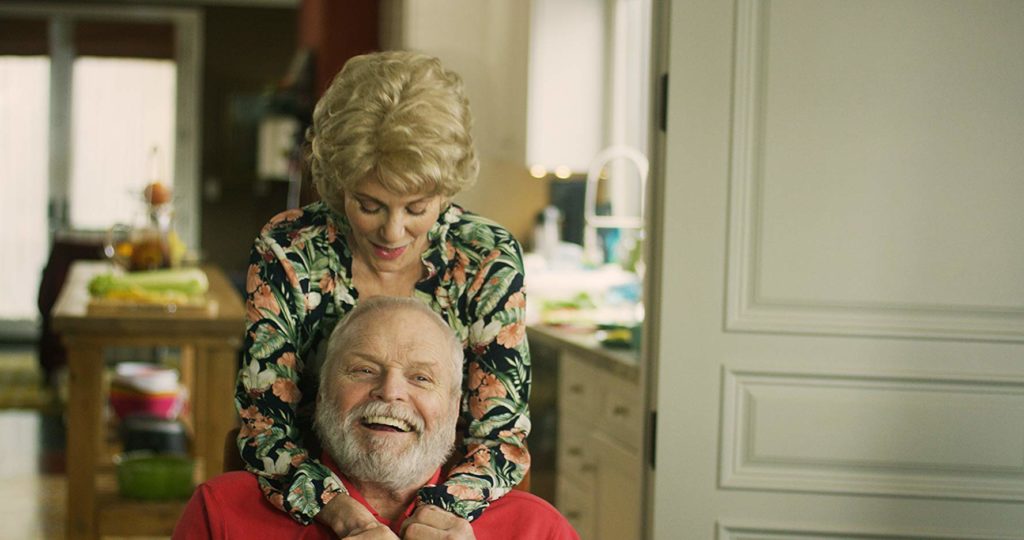
Then, as the clan gathers and reflects over the past few days leading up to his demise, we meet Bob. A former military man, Bob can be characterized with a word – strong. Physically, emotionally, as well as strong in his convictions to morals and ethics. His old school values permeate the bright sunny kitchen of the family home where we hear him talk about life, hard work, practicality, his expectations for his adult children (especially Eddie who feels he is somewhat of a disappointment in his dad’s eyes), and his love for his platinum-haired, cigarette pant/pearl-wearing, red-lipsticked Dawn. What he, and men of his era in general, did not talk about was emotions. We also see the fracture between the adult children and Dawn, the latter whom loves nothing better than to make remarks to all about their larger frames and weight, sincerely disguised in the form of healthier eating recommendations.
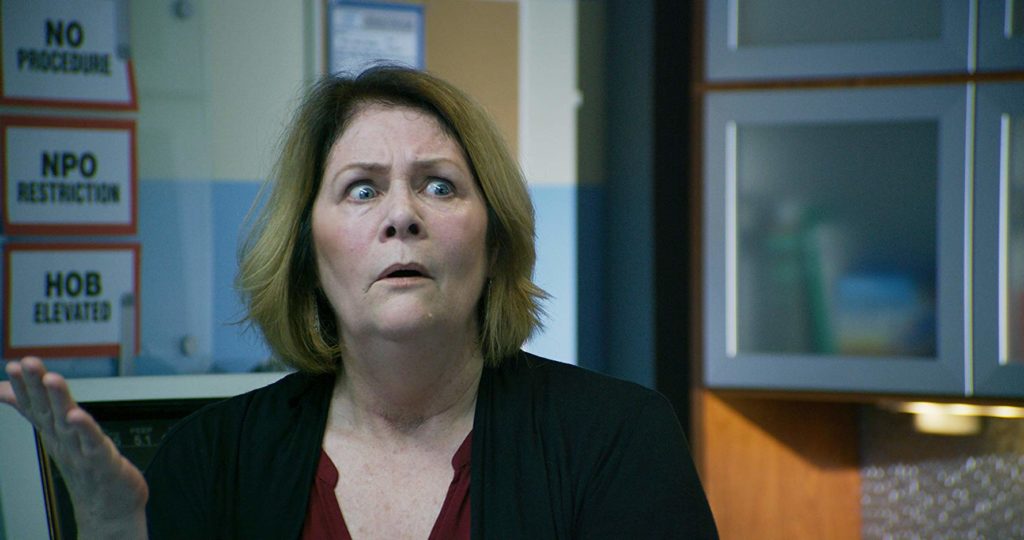
Poignant in its observational humor, 3 DAYS WITH DAD celebrates the insanity and craziness that surrounds the Mills family once Eddie arrives on the scene. Situational comedy abounds with multiple instances that remind us that truth is stranger than fiction. (How about a human crematorium having to send a body to a veterinary crematorium and your loved one is wheeled into a room with a dog? Or hospital staff that leaves the family to navigate their loved one to the bathroom with 4 IV attachments?) Clarke spares no feelings and is brutally honest with his observations. But it’s from that, that humor comes. We see and feel through Eddie’s eyes as the odd man out now plunked down in the middle of familial chaos and tasked with giving the eulogy at Dad’s funeral. Part of the challenge that Eddie faces is that in order to deliver what many would deem an “appropriate” eulogy, he must come to terms with his own life, his relationship with his dad, and particularly his past, something he must face head-on during the three days of dying, death, siblings, a step-mom, and funeral arrangements.
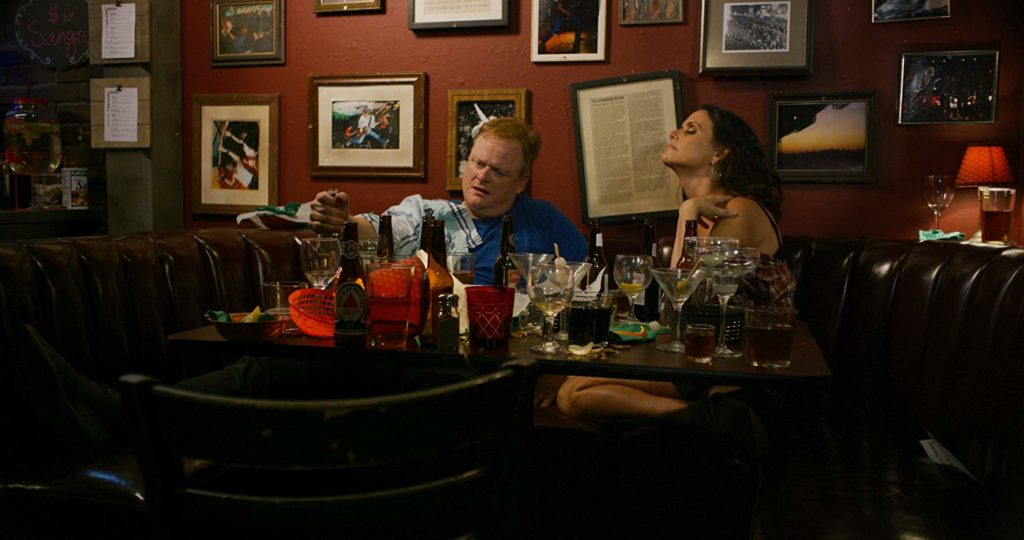
Larry Clarke’s clear strong suit is in his casting and calling upon his own talent and expertise as an actor, casts actors with not only a similar skill level to his own, but actors who know how to play well with others in the sandbox. You can do no better than Clarke’s casting in 3 DAYS WITH DAD. Scene-stealing Tom Arnold as Andy. The hilarious Mo Gaffney as Diane. The big teddy bear Eric Edelstein as Zac. Jon Gries as Tim. Larry himself as Eddie. And then Clarke taps Brian Dennehy, who delivers the most vulnerable and sensitive performance of his career as Bob, while Lesley Ann Warren knocks it out of the park with the meatiest role she has had in years as Dawn. Warren is award-worthy in this role. For some added comedic spice, Clarke then brings in JK Simmons as a newbie funeral director trainee and David Koechner as the doctor you may not want near your loved one at life’s end. Then to add some youth and vigor, young “General Hospital” star Hudson West comes onboard as Devon adding a wonderful tacit story element akin to the “circle of life”. Each fuels the funny with an honesty that is pure, palpable, and resonant while the dialogue is natural and easy. Delivery is sharp and befitting each character, with timing even sharper, a testament to the skill of each actor.
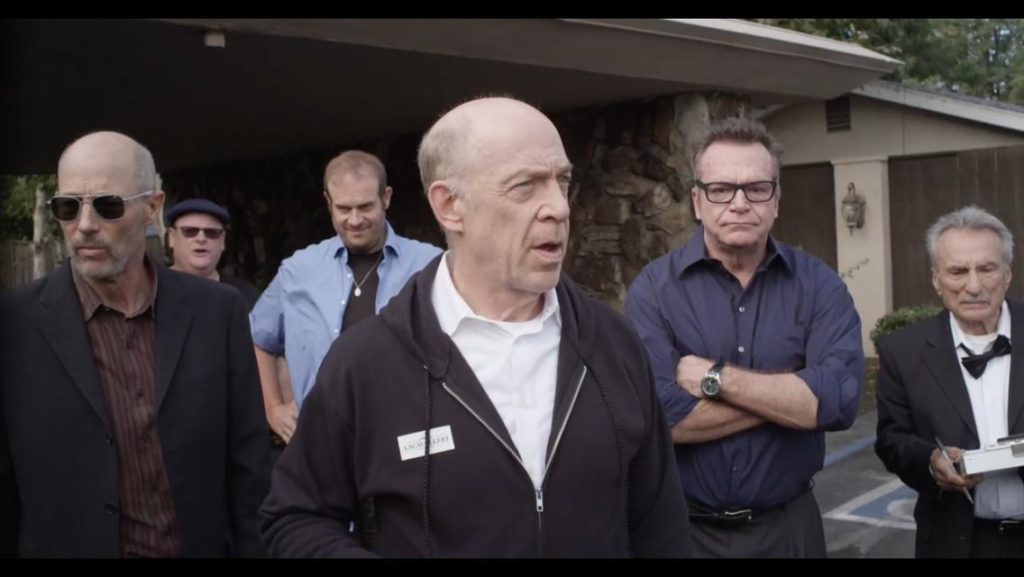
Expounding on his casting, Clarke, together with his cinematographer Chris Gallo, not only keeps the film’s visual tonal bandwidth light but keeps the film well lighted with natural light, avoiding the darkness of death. A pleasant surprise that flies in the face of what many first-time directors do, is that Clarke gives his actors the physical space in which to play thanks to framing and a freer blocking. And there is plenty of situational comedy throughout the film that benefits from this. Noteworthy is that whenever the siblings are all together or with Dawn, the camera is framed just wide enough to include all in picture, thus allowing the actors space to play and the camera to capture the spontaneity of action and reaction without cutting. This bodes extremely well for this ensemble and this story. Kudos also go to Gallo and Clarke for providing visual interest through angles and light when shooting in claustrophobic spaces like a hospital room.
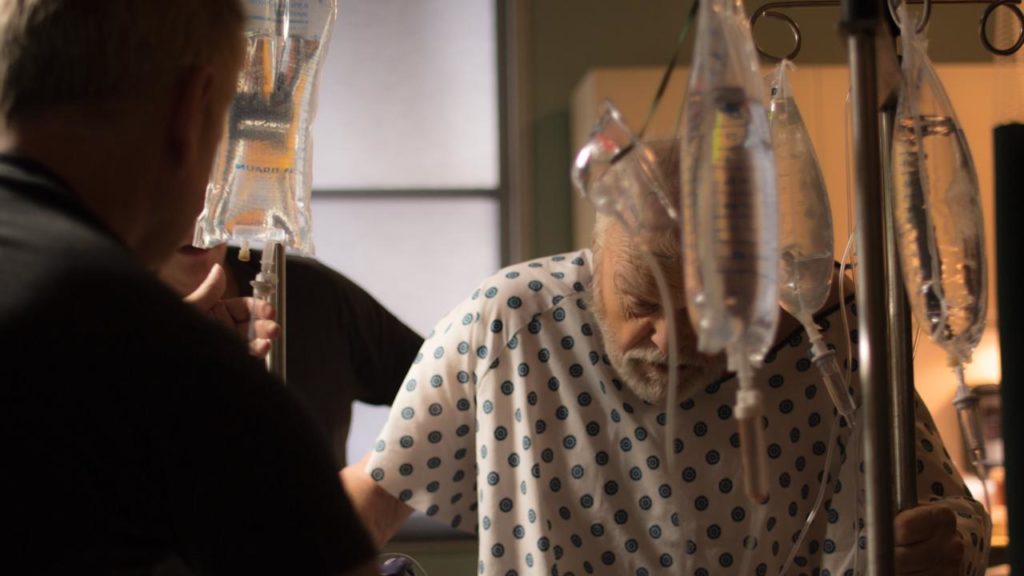
Editing has a nice pace to it and for the most part, allows scenes to breathe and for lines of dialogue to land without feeling rushed.
Clarke also pays great attention to the film’s score, tapping the talents of John Ballinger as composer. Light, with often a lilt that gives a nod to the Mills’ Irish-Catholic roots, the score has a nice lyrical flow which mirrors the fluidity of Gallo’s camera.
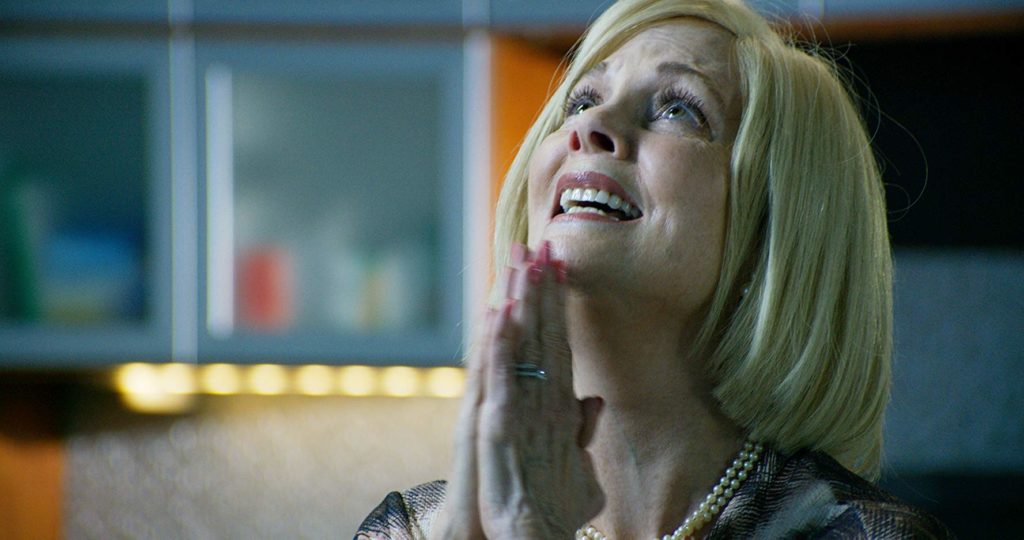
3 DAYS WITH DAD belies Larry Clarke being a first-time feature director. Casting is superb. Production values are excellent. Clarke knows this story, he knows the characters, he knows his audience. There’s so much emotion underlying the story and so much more that could have been included through visual anecdotes or exposition, but Clarke knew when to step back and say “enough is enough” and just let 3 DAYS WITH DAD live and laugh.
Written and Directed by Larry Clarke
Cast: Larry Clarke, Tom Arnold, Eric Edelstein, Mo Gaffney, Brian Dennehy, Lesley Ann Warren, Jon Gries, JK Simmons, Davis Koechner, Hudson West
by debbie elias, 09/12/2019












